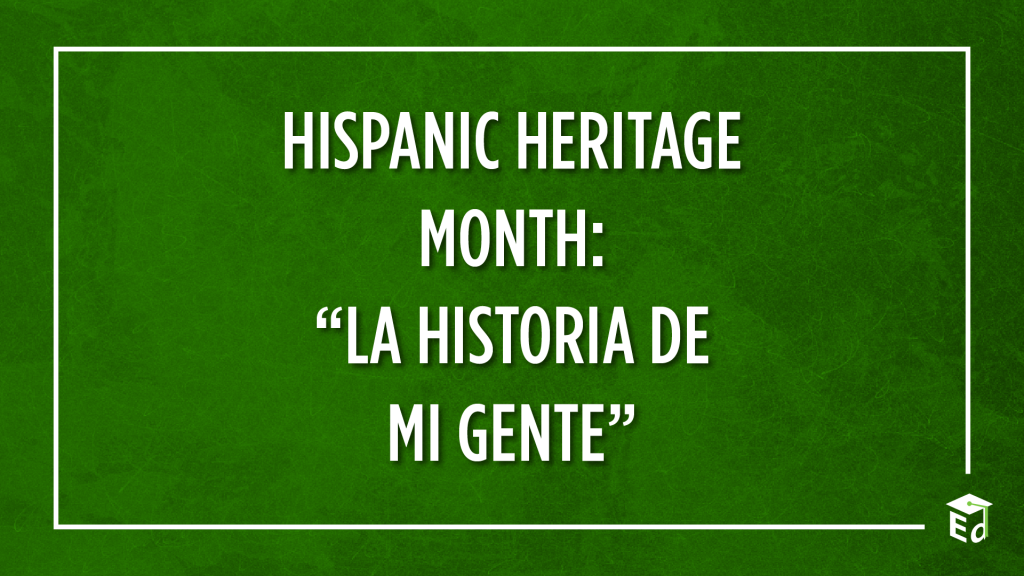Hispanic Heritage Month: “La Historia De Mi Gente”

By: Amanda Zepeda
My first teachers were my parents. Both grew up in immigrant households in the vibrant city of Los Angeles. They were Chicano latch-key-kids of the 1970s. My father began working at a young age, supplementing the family’s income with a paper route before school and gardening work with my grandfather on the weekend. My mother loved reading and writing. She was always naturally good with numbers and words, which made her stand out in her classes. Both were quick-witted and capable, and yet neither of them were particularly pushed by their parents academically. As a defiant reaction to this, my parents made it a point to repeat phrases such as “Appreciate what you have”, “Pay attention in school”, and “You’re going to college!”. They made it their mission to ‘break the cycle’ and give us what they had not been given.
My dad eventually got a job right out of high school, and my mom made her way to a four-year university, encouraged to do so by her teachers. She dropped out before graduating, but eventually went back almost twenty years later to cross that stage. The experiences that they had helped to shape who they became and thus shaped how they decided to raise my siblings and me. They taught us the importance of family, to show compassion, to persevere, and most importantly, the value of education.
I believe education is the most valuable source of freedom a person can have. Throughout history, people have been imprisoned, punished, and castigated over knowledge. Thousands have fought to obtain it and others have fought to keep people from having it. Knowledge is our way to success; knowledge of our culture, knowledge of our people, and knowledge of our history.
Growing up in the San Fernando Valley, I was surrounded by my Latino community. However, I did not always see myself or my community represented in school. We learned about Columbus, the California Missions, George Washington, Andrew Jackson, and many other topics and yet the accomplishments of my communities were mysteriously missing from our textbooks and discussions. While those people and events are important to understand the complexity of United States history, they do not tell the complete story.
The first time I had a Latina teacher was the first time I had a teacher that spoke like me, looked like me, and had stories like mine. I did not have this experience until I was in community college. Before this, I had felt disconnected from my history, my family’s story, and myself for so long. I didn’t even realize anything was wrong. Sitting in my first Ethnic Studies class was the first time I learned about Native resistance against Europeans throughout North America, or about empowered Chicanas in the 1960s demanding social change, or about the intertwined history between the United States and Latin America. It was my history; my family’s story being told. A story of immigration, loss, trauma, love, strength, and perseverance. La historia de mi gente. I realized that this is what I wanted for the next generation. I didn’t want them to wait twenty years to hear their stories. I wanted them to see themselves reflected, acknowledged, and valued in their K-12 classes. So, I decided to continue what my parents had begun, to attempt to “break the cycle” of lack of education for as many kids as I could. I decided to become a teacher.
Celebrating Latino Heritage month to me means commemorating and acknowledging those that came before us. It means honoring our ancestors and sharing their powerful stories in and outside the classroom. Stories of community, of resistance, of love, of passion, of struggle and of achievement. Stories that we can learn from, that will bring us together, and make us stronger.
Amanda Zepeda is a second generation Chicana from the San Fernando Valley. She was a community college transfer student that graduated from San Francisco State University with a double major in History and Latina/o Studies and a minor is Race and Resistance. This is her second year as a high school educator teaching both Ethnic Studies and United States History and has been working within the education field for the past eight years.
Legal Disclaimer:
EIN Presswire provides this news content "as is" without warranty of any kind. We do not accept any responsibility or liability for the accuracy, content, images, videos, licenses, completeness, legality, or reliability of the information contained in this article. If you have any complaints or copyright issues related to this article, kindly contact the author above.

